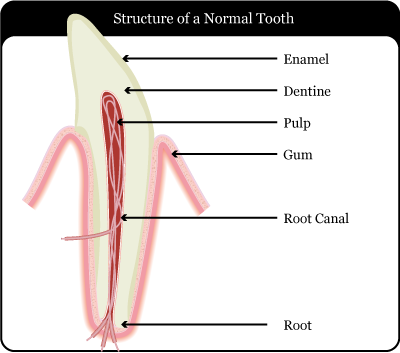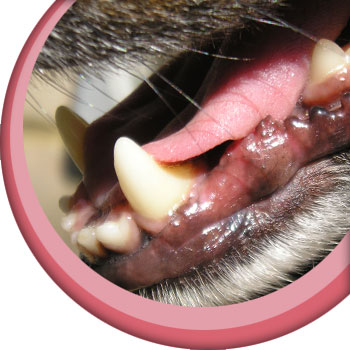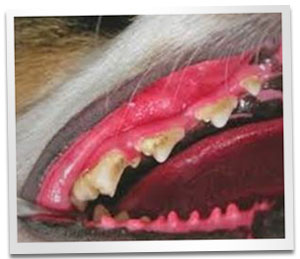Dental Disease
Dental disease is extremely common in our pets. We are also frequently unaware that there may be a problem as our pets can cope surprisingly well with quite a severe level of dental disease, and often do not show many signs. Just because your dog or cat is eating well doesn’t mean that they don’t have dental disease. It is important to get used to checking your pet’s mouth to make sure everything looks healthy, and don’t be afraid to consult your vet if you’re not sure as they will be happy to advise you. At some practices, nurses will offer dental checks for your pet, and be happy to discuss dental care with you.


What happens in dental disease?
The most commonly seen problem in dogs and cats is periodontitis. This means the inflammation and damage to tissues around the teeth such as the gums. It is a progressive condition, beginning with only mild changes:
1. Plaque builds up on clean teeth. Plaque is a white sticky substance made up of food particles and bacteria. This can start to irritate the gums causing gingivitis (inflammation of the gums – they will start to look red near the tooth).
2. If plaque is not cleaned off the teeth, it starts to turn into calculus. This is when minerals from fluids like saliva make it into a harder substance.
3. The calculus has a rough surface which makes it easier for more plaque to accumulate and the condition to progress.
4. The associated gingivitis gets worse and as the animal gets older it progresses to periodontitis. The attachment of the gums to the teeth moves backwards and pockets are formed under the gums. Tooth roots become exposed and the teeth become loose. Infection can enter the pockets of gum and spaces around tooth roots. The teeth will eventually fall out.
What to look for
• Red or bleeding gums.
• Visible calculus on teeth.
• Bad breath (halitosis).
• If the condition is severe your pet may show signs of pain.
It is important to always get your pet checked by your vet as soon as you can if you think they have any signs of dental disease.

Treatment
If your vet thinks your dog or cat has dental disease there are a few things they may suggest in order to help treat the condition.
• If the problem is quite mild they may suggest starting brushing your pet’s teeth at home, or using a mouth rinse.
• For more severe cases your pet may need to have further dental treatment at the surgery. This may be a scale and polish to remove calculus and plaque from the teeth, or some teeth may need to be extracted (removed) as well. Your pet will need to have a general anaesthetic (be fully asleep) for this procedure. Once the teeth are all nicely cleaned, your vet will then advise you on things you can do at home to keep them that way, such as brushing.
• Your pet may be prescribed antibiotics before and after a dental procedure as there is often bacterial infection present in the mouth in cases of dental disease.
• It is important to remember that although early changes to the gums may be reversible, more severe damage is not. It is therefore all the more important to look after your pet’s teeth once they have had a dental procedure as they may be more susceptible to further progression of periodontitis, and always consult your vet if you are worried.
Prevention is better than cure
The best way to deal with dental disease is not to let it happen in the first place. Regular brushing of your pet’s teeth can really help to keep their teeth and gums healthy. It is important to introduce them to tooth brushing gradually, and ideally when they are younger, to ensure that they get used to it and it becomes far less stressful for everyone involved! This may take patience but it is worth it in the long run. Pet toothpaste and toothbrushes are available, and your vet or veterinary nurse will be able to instruct you on how to brush the teeth properly and safely.
Disclaimer: This website has been designed to offer information surrounding the use of antibiotics and infection control for pet owners. It does not replace advice from your veterinary surgeon. If you believe your pet is unwell or you have any questions relating to their treatment, please always contact your veterinary surgeon for advice.

